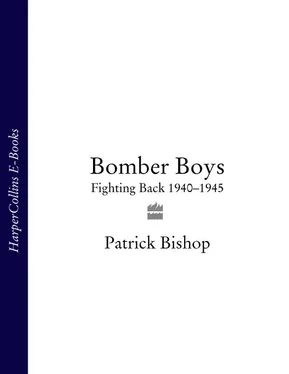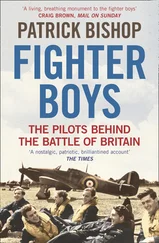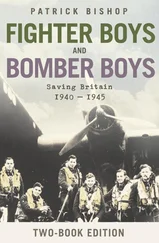Nobody, it seemed, wanted victory to be tarnished by reminders of the methods that were used to obtain it. Harris had a simple explanation for the ambivalence. ‘The bomber drops things on people and people don’t like things being dropped on them,’ he remarked after the war. ‘And the fighter shoots at the bomber who drops things. Therefore he is popular whereas the bomber is unpopular. It’s as easy as that.’ 4
There was much in what he said. In the United States, which was never touched by aerial bombardment, there was no such uneasiness and the crews of the Liberators and Flying Fortresses were honoured alongside the rest of America’s fighting men and their deeds praised in films like Twelve O’Clock High . The official assertion that Americans were engaged in precise bombing, rather than the area bombing practised by the British, was widely accepted, even though the distinction often meant little to the people underneath.
The strategic air campaign fought by the RAF and the USAAF was a terrible novelty. For the first time, aeroplanes were used in huge numbers against large population areas to smash an enemy’s capacity to make war by destroying its industry and demoralizing its civilians.
The German Blitz of British cities over the winter of 1940–41 provided the campaign’s initial justification. Bomber Command’s subsequent raison d’être was that it was the main means of exerting direct offensive pressure on Germany, within its own territory. At first the crews flew smallish aeroplanes carrying negligible bomb loads and were guided by primitive navigational aids. In the month of February 1942 when Harris took over his men dropped 1,001 tons of bombs. Better aircraft, new technology, cleverer tactics, Harris’s ruthless style and – above all – the courage and skill of the crews, turned the air force into the most potent proof of Britain’s will to win. In the month of March 1945, with Allied troops closing on Berlin, they dropped 67,637 tons and the Americans 65,962. By the end, the hurt the Luftwaffe had done to Britain had been repaid over and over. German air attacks against the British Isles, including those by V weapons late in the war, killed just over 60,000. Estimates of the deaths caused by Allied bombing of Germany range between 305,000 and 600,000. The cities touched by the Blitz were scarred but not devastated. In 1945 Germany’s seventy biggest towns and cities were in ruins and one in five dwelling places destroyed. 5
This disproportionality caused very little anxiety at the time. Germany had struck first and deserved the retribution the RAF was meting out. What concern might have been felt at the suffering of German civilians faded in the knowledge of the price the Bomber Boys were paying to deliver this vengeance. It was impossible to hide the losses and the government did not try.
This was a home-front war and civilians along the outbound and inbound routes to the Continent were present at the opening and closing scenes of the action. During the war years the RAF in Britain grew into the most visible of the services. In the bomber station-cluttered east and north there seemed almost as many airmen and-women as there were civilians. ‘By the time I got there Lincoln had turned blue,’ remembered Reg Payne, a wireless operator who was based at Skellingthorpe just outside the city. 6
Bomber Command grew and grew as the volunteers arrived in numbers that never slackened even during the darkest hours of its campaign. Behind each man flying, there were many more keeping them in the air. There were fitters and riggers and armourers maintaining the huge aeroplanes. There were WAAFs who drove the crews to their hangars and staffed the operations rooms when ops were on. There were the women who served them their dinner before they took off and, with luck, their breakfast when they returned home. RAF men met and mingled with local women in dance-halls and pubs, flirting with them, sometimes sleeping with them, often marrying them. Homesick young men were adopted by families and would slip away for an afternoon in front of a coal fire in a front parlour that reminded them of the family life they had left behind.
The many Britons who had seen the RAF going into action, droning overhead on their way to and from Germany and France and Italy, relished the sight. They learned of what they did there from the newspapers and BBC radio for whom Bomber Command’s activities provided the main source of good news for much of the war. The tone of the reports was exultant. ‘The Vengeance Begins!’ was the strapline on the Daily Express front-page story of Monday 1 June 1942 announcing the first thousand-bomber raid on Cologne. The sky over the city was ‘as busy as Piccadilly Circus’. One bomber passed over every six seconds and 3,000 tons of bombs were dropped in ninety minutes [The real figure was 1,455 tons]. It was particularly pleasing to report that the official communiqué from Berlin admitted that ‘great damage’ had been done. ‘Germans squeal “havoc, misery”’ was the headline on the story of how the Nazis had reacted to the raid.
The RAF had saved the country from invasion by winning the Battle of Britain. It had failed, it was true, to prevent the Blitz. But now, night after night it was carrying the war to the Reich, paying the Germans back in kind and contributing mightily to the downfall of Hitler and the Nazis.
That was how it was seen by British civilians as they read accounts of devastating attacks on previously obscure towns such as Essen, Duisburg and Gelsenkirchen and great cities like Hamburg and Cologne and, above all, Berlin. This was how it was presented by Harris, a natural propagandist, who strove to create the impression that with each raid the road to victory and peace was one step shorter. This was what was believed by the majority of the men who were flying the aeroplanes. They tended to be bolder and more imaginative than the rest of their contemporaries. Flying was dangerous but they preferred its perils and the relative informality of RAF life to the drudgery of existence as a soldier. In letters and diaries they reveal a high degree of idealism and optimism and a strong sense that they were fighting not only to destroy a present evil but also to lay the foundations of a future good.
In a letter to the father of his friend Andrew ‘Paddy’ Wilson, who was killed during a raid on Düsseldorf in June 1943, Sergeant John Lobban, the sole survivor of the crew, wrote: ‘They died for the greatest of causes, the freedom of the peace-loving nations and I only wish that fate could have let us play a greater part in bringing the war to a close.’ It had been their first operation. 7
Such idealism is found mainly in the young. Many of the Bomber Boys were barely out of their teens, though the almost constant strain they lived with made them seem older. They were called Dougie and Ron and Ken and Reg and Bill. They came from the middle reaches of society and were strongly marked by their time. In their short lives they had felt the numb emotional pain left by the last war and sensed the mounting dread among their elders as the next one approached. They knew what poverty was and had witnessed the cruelties of interwar capitalism. If there was a dominant political outlook among the crews it was a mildly sceptical socialism and belief in social justice. But overlying it always was a profound sense of duty. None of them set out to destroy German cities and few cared to reflect too closely on the effects of their bombs. But like the rest of their generation, they possessed a patriotism and respect for authority that had barely been dented by their knowledge of the First World War. It was easier for them to do what they did because they tended to believe what they were told about the purpose and progress of their struggle. It was an outstanding peculiarity of the strange new conflict they were engaged in that there was no real measure of gain. Armies could gauge success by the amount of ground taken or the number of enemy killed or captured. Navies could do so by the quantity of enemy tonnage sunk. But how did you judge the achievements of a bombing campaign?
Читать дальше












